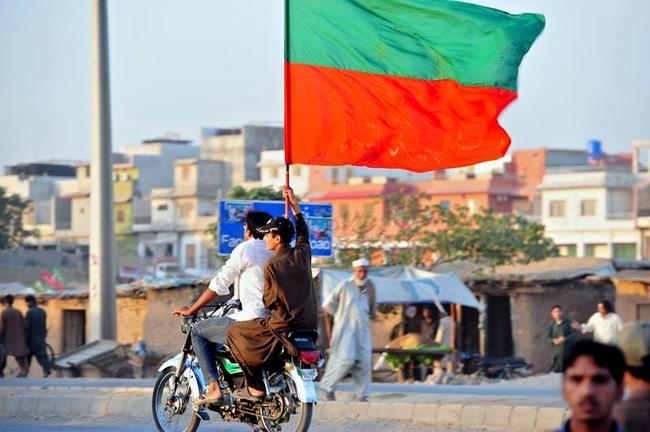Democracy reasserted its role in Pakistan through the Parliamentary elections, giving a rare chance for smooth transition of power in a country plagued by constant political upheavals, some of them terribly violent.
The recent polls threw up a situation in which no one is a clear winner. Cricketer-turned politician Imran Khan and his Pakistan Tehreek-e-Insaf (PTI) party emerged the strongest in this polls and he is in the works for formation of a coalition ministry to take the political process to its logical conclusion. He could be Prime Minister with backing from independents and small-time parties so as to muster the required 20 plus seat-strength for a majority. This is his only option and chance, however, and that implies political stability would be a far cry.
The scenario that the present polls threw up is simply invitation to trouble. The two established parties fared poorly. The Pakistan Muslim League-Nawaz (PML-N) got 63 seats and the Pakistan People’s Party (PPP) 43 against the PTI’s 116 seats. Imran Khan’s victory cry was thus muted. The road ahead for him is paved with stones. A coalition comprising conflicting interests is no panacea to political uncertainty. It was so in India; and it will be so in Pakistan as well. If anything, Imran Khan has proven his inability to get the nation to firmly stand behind him. On the other hand, the results are being viewed as democracy strengthening in Pakistan. The opinion that Imran was backed by the Army does not seem to hold water. No one, though, can run the government in Pakistan without active cooperation of the army. A coalition is always the best balancer and Pakistan has got it.
A fractured verdict is proof of the confusion that reigned supreme in the electoral arena. The PNL-N led by former prime minister Nawaz Sharif is by far the strongest political establishment in the country in terms of mass base and organisational network. The corruption allegations that hit him hard in the context of the Panama Papers leak, the court strictures that followed, his eventual exit from PM post, and the jailing that came in the run-up to the voting day worked eminently against Sharif and his party. The last straw on the camel’s back was the circulation of a report two days before the polling day that said Sharif was critically ill due to kidney malfunction. Under the circumstances, Pakistanis could ill afford to back this horse. The Bhuttos, on the other hand, were progressively falling in esteem because the new generation leader Bilawal Bhutto failed to inspire the masses, unlike what his mother Benazir Bhutto.
As Imran Khan is hoping to be the next PM, he would clearly start his stewardship of the government on a weak wicket. How long this political experiment would last is anybody’s guess. What Khan can at best hope for is to play to the gallery in ways as to win mass support on a larger scale, call for fresh polls sooner than later and seek to reassert his authority. Or, he has another option: That of truly getting down to create an atmosphere of positivity in his country and to try to do serious development among the poor and the uneducated and offer a reliable administration. Which game he chooses to play, or the others for that matter, remains to be seen.
The assumption being spread in India that Khan has the backing of the military, the parallel power centre in Pakistan, alone will not be of much help to him. Neither the PPP nor the PML-N would sit quiet on the Opposition benches. Chances are that Khan, if he takes over as PM, would be under terrible siege. There are good tidings on the poll front in Pakistan. For one, democracy was given a chance for survival. This would be the second smooth transition of power in Pakistan, and it shows the people’s increasing commitment to the cause of democracy. Also, most notably, the people have rejected with disdain the pro-terror political outfits, including Mumbai terror attack mastermind Hafiz Saeed’s Allah O Akbar Tehreek (AAT), they having failed to win even a single seat. Hope against hope is that, starting with Imran Khan, democracy will ultimately have the upper hand in Pakistan.
In this critical time, Indian diplomacy seems to have lost its moorings. This is evident from the silence on the part of the external affairs ministry to simply ignore his “victory” statement, offering to take two positive steps for peace with the western neighbour, if India took one such step. What India caught on, instead, was on his stress that Kashmir remained as the core issue between India and Pakistan, requiring bilateral talks. India chose to renew its stand that Kashmir is no more an issue to be discussed with Pakistan. By ignoring brutal realities of a huge war-like situation that cannot be wished away and daily deaths of army/security personnel, India seems incapable to understand that every call to negotiation is worth a try. Like all Pakistan leaders of the past, Imran, too, has to keep his army and people happy. If India, being such a large nation, is profusely bleeding every day, Pakistan, too, must be suffering in a similar manner. While they have USA and China to nurse them in turns, India has no friends in the world to stand by it today. Therefore, India should have been more welcoming to Imran than what it has demonstrated now by its cold shouldering.
